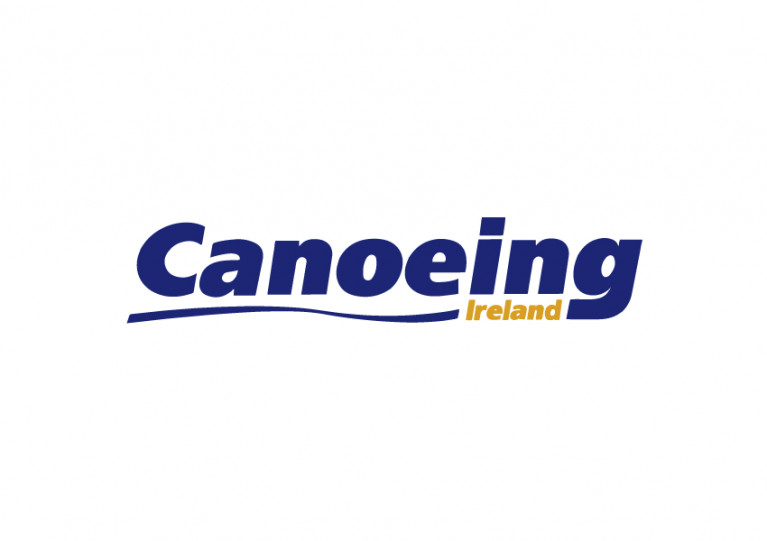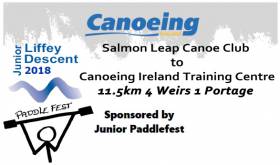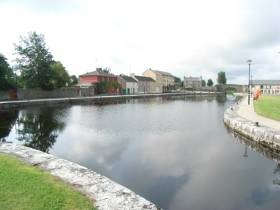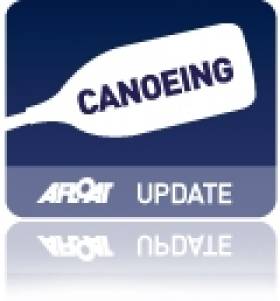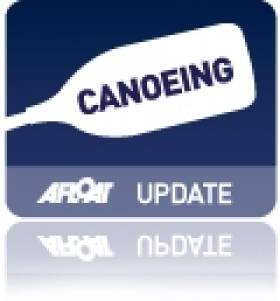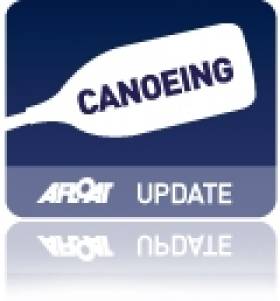Displaying items by tag: Canoeing Ireland
Caution Advised on Grand Canal in Celbridge For Canoeing Ireland Selection Event This Saturday
Waterways Ireland advises that a Canoeing Ireland selection event will take place this Saturday 3 April on the Grand Canal at the Celbridge Paddlers Canoe Club–Alymer’s Bridge area.
This event is part of the Tokyo Olympic and Paralympic qualification pathway and has been deemed an essential activity by Sport Ireland.
Masters of power boats are requested to navigate with due caution and obey all instructions from event stewards.
Canoeing Honours its Stars in New Ceremony
#Canoeing: The inaugural Canoeing Ireland National Awards at the Spa Hotel in Lucan on Saturday night were a success. The prizes were spread across a range of disciplines, with young competitors to the fore. Jenny Egan and Ronan Foley were honoured in both sprint and marathon categories. One of the most popular awards on the night went to Aido Barber of canoe polo. He was named the volunteer of the year.
The keynote speaker was the president of the Olympic Federation of Ireland, Sarah Keane.
Canoeing Ireland National Awards
Freestyle: Senior Male: Dave McClure. Junior Female: Aoife Hanrahan, Junior Male: Sean Noonan.
Marathon: Sen: Jenny Egan, Barry Watkins. Jun: Ronan Foley
Polo: Sen: Rachel Molloy, Mark McCormack. Jun: Ciara Gurrhy, Zeke Wilson.
Slalom: Sen: Aisling Conlan, Liam Jegou. Jun: Maeve Martin, Tom Morley.
Sprint: Sen: Jenny Egan, Patrick O’Leary (paracanoeist). Jun: Kate McCarthy, Ronan Foley.
Surf: Sen: Aisling Griffin, Michael Barry. Jun: Megan Gamble, Jamie O’Brien
Whitewater: Darragh Clarke (junior male)
Community Impact: Kilkenny Aqua Canoe Club
Event of the Year: UCD Varsities
Team of the Year: Kilcock Demons
Volunteer of the Year: Aidrian Barber
Mackey to Head Canoeing Ireland High Performance Programme
#Canoeing: Jon Mackey is to head up high performance at Canoeing Ireland. Mackey, who works as training and development officer at Canoeing Ireland, is national coach for Kickboxing Ireland. In this role he guided the Ireland team to fourth place on the medals table at the junior World Championships in Jesolo in Italy in September. He is also studying for a Masters in coaching science in sport at UCD.
Mackey said he was looking forward to his new role and that Irish canoeing had some of its best results on the international stage this year. “We have a team with huge potential and I look forward to working along side them as we endeavour to make our mark on the European, world and Olympic stage.”
Paddy Boyd, the outgoing ceo of Canoeing Ireland, said the appointment addressed a need. “There is undoubted paddling talent in Ireland, borne out by recent results. It is incumbent on Canoeing Ireland to provide the support for our ambitious young athletes.”
Young Kayakers Set For Tomorrow’s Junior Liffey Descent
#Kayaking - The Irish Times has a preview of Ireland’s largest junior kayaking race — and one of the biggest events in some time for Canoeing Ireland — which takes place on the River Liffey tomorrow (Saturday 19 May).
The Junior Liffey Descent is set to bring more than 160 young paddlers to Leixlip for racing to Strawberry Beds across 19 categories in four boat classes tomorrow afternoon.
#Canoeing: Paddy Boyd, who was previously the chief executive of the Irish Sailing Association, has been appointed as interim chief executive of Canoeing Ireland. The Dún Laoghaire man will run the organisation until a full-time chief executive is apppointed.
Boyd, who is a master mariner by profession, was chief executive of the ISA for 16 years until the end of 2004. Under the Dún Laoghaire man, the sport grew, and he was an important agent in the professionalisation of the association.
From 2009 to 2015 Boyd served as chief executive of Sail Canada.
Sport Ireland hopes that a new, full-time, ceo will be appointed in the medium term. “I’m here to help out for a few months,” Boyd said.
The previous chief executive of Canoeing Ireland was Karl Dunne.
Clondra Hosts Canoeing Club Championships Next Month
#Canoeing - Richmond Harbour on the Royal Canal in Clondra, Co Longford will be the site of the Canoeing Ireland Club Championships over the weekend of 16-17 April.
As the Longford Leader reports, the event coincides with the second annual Longford Blueway Festival taking place in the town and surrounds.
Up to 500 competitors and their supporters are expected in Clondra for the national canoeing contest which joins a number of events scheduled for the weekend, including cycles and walks of the 10km Camlin Loop of the Shannon Blueway that was launched last year, as previously reported on Afloat.ie.
There will also be public 'taster sessions' on the water for those curious about canoeing whether for sport or recreation. Details are available on the Canoeing Ireland website.
The Longford Leader has more on the story HERE.
Karl Dunne Given New Role as Chief Executive of Canoeing Ireland
#Canoeing: Canoeing Ireland has appointed Karl Dunne as its new chief executive. Dunne has been the general manager of the body since March 2012. The recruitment process for the new post was, according to Canoeing Ireland, undertaken by independent HR Consultants as part of an organisational restructuring programme.
Paul Donnelly, the president of Canoeing Ireland, said: “I am pleased that this important position of CEO of Canoeing Ireland has been filled. One of the CEO’s first tasks will be to finalise the development and implementation of a new Strategic Plan for the organisation to guide its development and expansion into the future. The Board look forward to working in cooperation with the CEO and his dedicated staff in meeting the challenges and opportunities which lie ahead.”
Dunne said: “It is an honour to be appointed to the role of CEO with Canoeing Ireland. Canoeing in Ireland has a proud history of both performance and participation and I look forward to working with the board and staff of the organisation and our partner agencies for the benefit of our members. Canoeing is a fantastic community sport that is very accessible. It is my priority to grow participation levels in the sport across the country.”
Canoeing Ireland is the governing body for the 70 affiliated clubs in the Republic of Ireland.
Canoeing Ireland Recruiting Youth & Club Development Officer
#Canoeing - Canoeing Ireland is recruiting a Youth & Club Development Officer to develop youth participation in canoeing and increase both the quantity and quality of canoe clubs in Ireland.
The successful candidate will be in charge of managing the Canoeing Ireland Training Centre with a focus on youth participation, which includes managing delivery of the instructor training initiative in view of club development.
They will also be expected to deliver junior training programmes – and a schools, scouts and youth competition calendar – across a broad range of disciplines.
Managing and delivering adult training programmes to kick start club growth and development will also be part of their remit, as will reviewing and developing new Canoeing Ireland club support materials, including the Club Kick Start Pack, sample constitution and sample SOPs and risk assessments.
Among the biggest requirements will be establishing a Canoeing Ireland Youth Kayaking Academy at the body's training centre at Strawberry Beds as a pilot project to be rolled out to towns and cities nationwide.
The successful candidate will also be expected to contribute at strategic events such as the Liffey Descent and junior and senior Paddlefests, as well as produce content for Canoeing Ireland's print and social media platforms.
Applicants must have at least a level 3 kayak instructorship, a full clean minibus driver's licence, a current CI-recognised first aid cert and a Coaching Ireland tutor qualification, among other requirements. All applications are also subject to Garda vetting clearance.
Full details on this role and how to apply are available via the Canoeing Ireland website HERE - which also has details on a vacancy for an administration officer. Applications must be received by Friday 16 January 2015.
Canoeing Ireland Shares In Coca-Cola Thank You Fund
#Canoeing - Canoeing Ireland is one of five sporting organisation to share in a €125,000 grant from the Coca-Cola Thank You Fund, as Business & Leadership reports.
The €25,000 to Irish canoeing's governing body comes via the soft drinks giant's initiative "aimed at encouraging people to incorporate physical activity into their day to day lives".
It's expected that Canoeing Ireland's share of the grant will help train a range of kayak instructors to get more young people interested in taking up the paddle.
Canoeing Ireland Sets Off On Road To Rio Paralympics
#Canoeing - With para-canoeing set to join the list of sports at the Rio Paralympics in 2016, Canoeing Ireland says it is keen to develop the sport and identify and support athletes with hopes of representing Ireland.
That was the message from Canoeing Ireland's Olympic Sprint chairman Eamon Fleming, who was on hand to thank Paralympics Ireland for accepting Canoeing Ireland into the Paralympics family at an event last week.
"We are very excited to be a part of the Paralympics family and see great potential in growing para-canoeing in the future," he said.
According to Fleming, he and Ireland's canoe sports governing body "were inspired to see para-canoeist Patrick O'Leary finished second in the men's 200m event in very tough conditions" at the first sprint regatta of the year in Nottingham last weekend.
Also now paddling his own canoe for Rio is two-time rowing Paralympian Kevin Du Toit, who is currently training out of Richmond Canoe Club in London – a home away from home for Irish paddlers over the years.
Karl Dunne, CEO of Canoeing Ireland, said: "We are delighted to have had instant success with Patrick's result in Nottingham, He will now compete at the European Championships in Portugal this summer.
"Canoeing Ireland look forward to working with Liam and his team on the road to Rio."


























